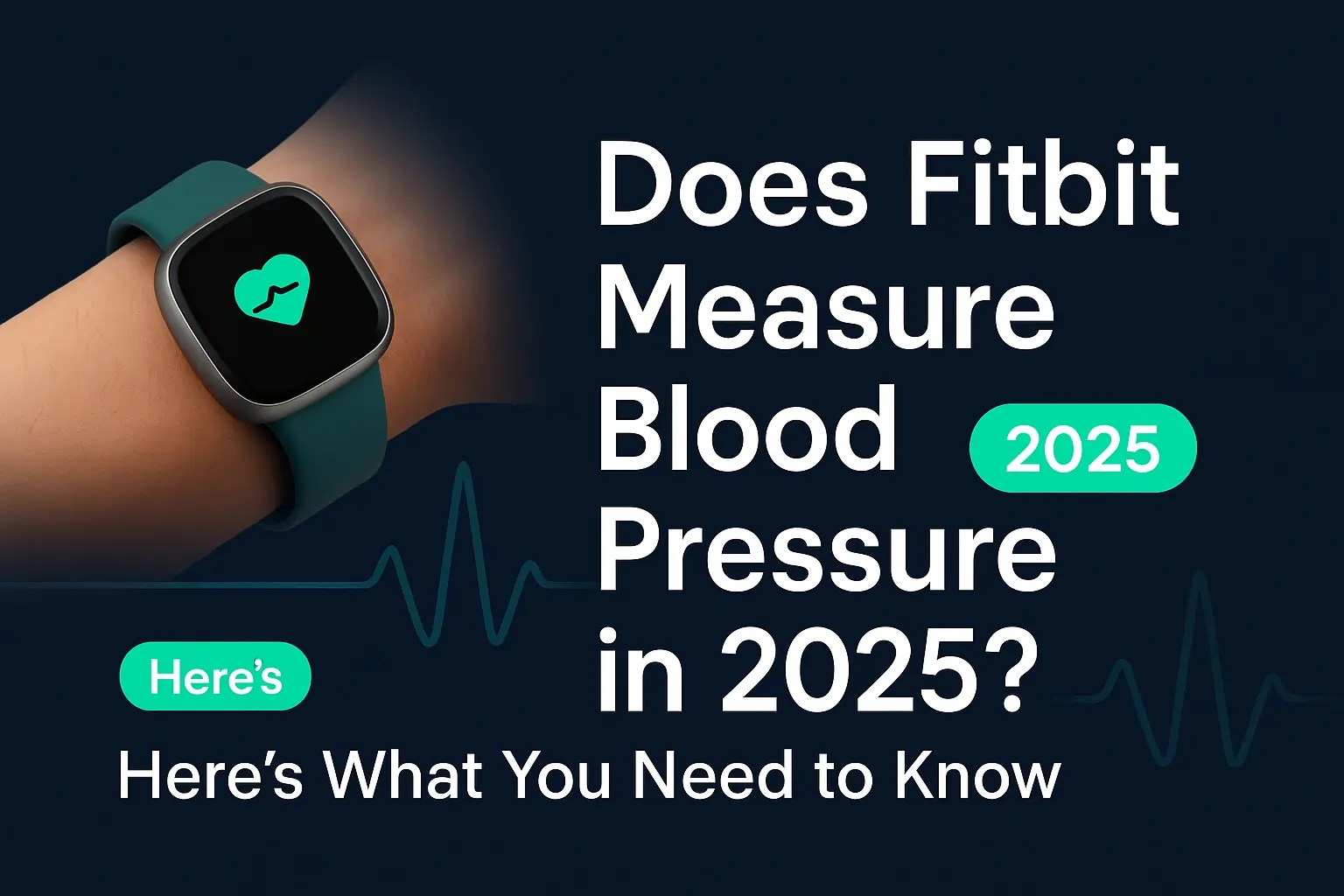If you’ve ever asked yourself, “Does Fitbit measure blood pressure?” — you’re not alone. With smartwatches and fitness trackers getting more advanced each year, people now expect them to do more than just count steps or track calories.
And since high blood pressure is a silent risk factor for heart disease, stroke, and kidney problems, it’s no surprise users want a Fitbit that can track it.
So let’s answer the big question: Can Fitbit measure blood pressure in 2025?
Can Fitbit Measure Blood Pressure?
Short answer: No.
As of 2025, Fitbit devices don’t provide clinically validated blood pressure monitoring. Unlike a traditional cuff, they can’t measure systolic and diastolic pressure directly.
Instead, Fitbit offers a range of indirect heart-health features, including:
- 24/7 heart rate tracking
- SpO2 (blood oxygen) monitoring
- ECG app (Sense & Sense 2 models)
- EDA scans for stress
- Skin temperature tracking
These features give valuable wellness insights, but they’re not a substitute for a medical-grade BP monitor.
Fitbit’s Research on Blood Pressure:-
Here’s where things get interesting: Fitbit is researching Pulse Arrival Time (PAT) — the time it takes for blood to travel from your heart to your wrist. Early studies suggest PAT might correlate with blood pressure changes.
But for now, this is still in the research phase. Fitbit hasn’t rolled out a commercial feature, nor has it received regulatory clearance.
Tip: Keep an eye on Fitbit’s official health research blog for updates.
Alternatives: Smartwatches That Measure Blood Pressure-
If BP tracking is a must-have, here are better options available in USA & India:
- Samsung Galaxy Watch 6 Series → Measures blood pressure via the Samsung Health Monitor app (requires cuff calibration).
- Omron HeartGuide → An FDA-cleared smartwatch with a mini inflatable cuff.
- Withings BPM Connect → Not a watch, but a smart portable BP monitor that syncs with health apps.
How Fitbit Still Helps With Heart Health?
Even without BP monitoring, Fitbit plays a big role in overall cardiovascular wellness. Here’s how:
- Resting Heart Rate (RHR): Tracking trends helps detect stress or possible hypertension.
- Heart Rate Variability (HRV): Lower HRV can indicate higher BP risks.
- Sleep Tracking: Poor sleep often worsens blood pressure. Fitbit’s sleep scores give early warnings.
- Activity Goals: Regular exercise reduces BP, and Fitbit’s Active Zone Minutes help you stay on track.
- Stress Management: Features like EDA scans and mindfulness sessions indirectly support heart health.
Fitbit vs Blood Pressure Monitors:
Here’s a quick breakdown:
| Device | Measures BP? | Accuracy | Best For |
|---|---|---|---|
| Fitbit Sense/Versa | ❌ | Not available | General health + fitness |
| Samsung Galaxy Watch 6 | ✅ (calibrated) | Moderate | Casual tracking |
| Omron HeartGuide | ✅ (FDA-cleared) | High | Medical-grade use |
| Withings BPM Connect | ✅ | Very High | Home BP monitoring |
Use Fitbit for fitness + lifestyle tracking, but stick to cuff-based devices for blood pressure accuracy.
Best Practices for Monitoring BP with Fitbit:
If you want to combine Fitbit data with reliable BP tracking:
- ✅ Use a validated cuff (Omron, Withings, etc.)
- ✅ Log BP readings manually in the Fitbit app
- ✅ Sync data to Google Fit or Apple Health
- ✅ Share combined insights with your doctor
This way, you get the best of both worlds — lifestyle tracking via Fitbit + accurate BP monitoring from a medical device.
Fitbit Users Want Blood Pressure Tracking:-
On Fitbit community forums, one thing is clear: users want BP monitoring.
This demand is likely driving Fitbit’s research into cuffless monitoring. If Fitbit manages to integrate this successfully (and gets FDA clearance), it could be a game-changer in wearables.
Final Verdict: Does Fitbit Measure Blood Pressure in 2025?
Not yet. Fitbit is excellent for heart rate, stress, and sleep tracking, but if you need reliable blood pressure data, stick to a medical-grade cuff monitor.
That said, Fitbit’s ongoing research into PAT could mean we see non-invasive BP tracking in future models — making it worth watching closely.
Until then, use Fitbit to track fitness, stress, and lifestyle factors, and pair it with a validated BP device for a complete picture of your heart health.
FAQs: Fitbit & Blood Pressure
Q1: Can Fitbit Sense or Sense 2 measure blood pressure?
No. They offer ECG and stress tracking but no blood pressure readings.
Q2: Will future Fitbits have blood pressure monitoring?
Possibly. Fitbit is researching Pulse Arrival Time tech, but it’s not available yet.
Q3: What are the best alternatives for BP tracking?
Samsung Galaxy Watch 6 (casual) and Omron HeartGuide (medical).
Q4: Can I sync BP data with Fitbit?
Yes, by logging manually or using third-party integrations like Google Fit.
Q5: Should I rely on Fitbit alone for BP health?
No. Use Fitbit for lifestyle tracking + a cuff monitor for accurate readings.

